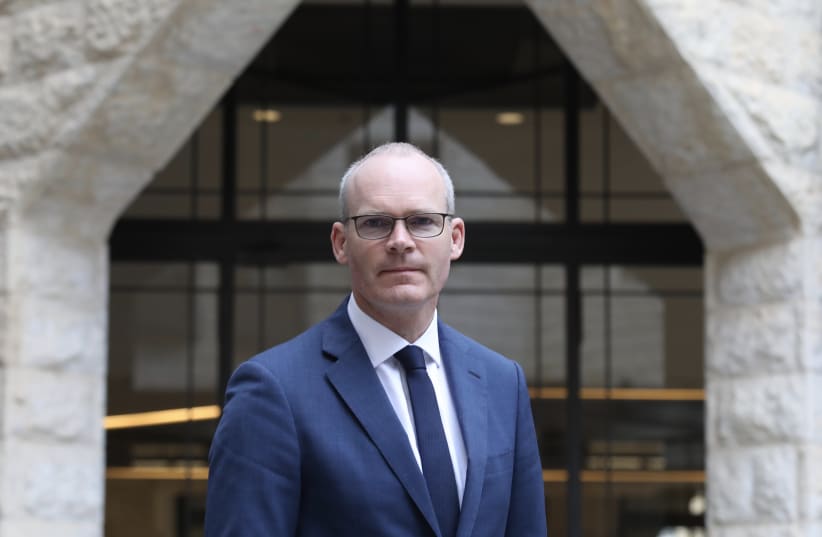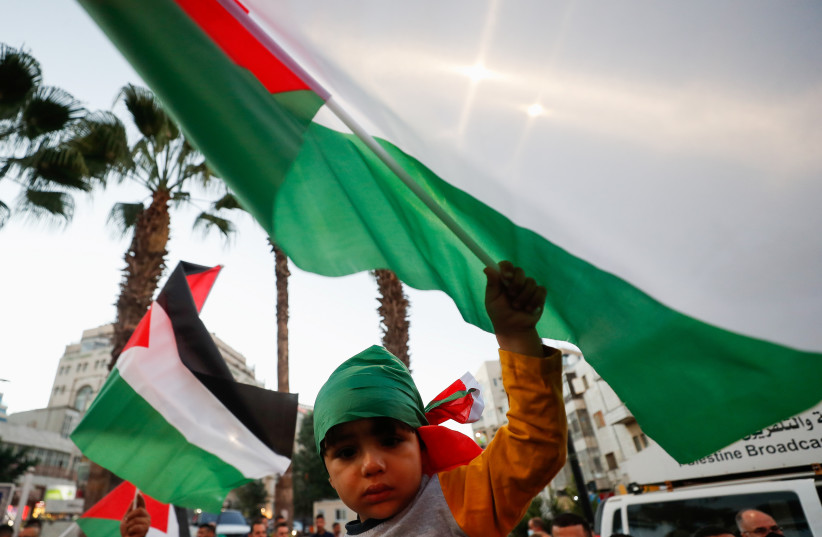Israel hasn’t shown Ireland or the European Union credible evidence to prove that there is substance behind its decision last week to designate six Palestinian nongovernmental groups as terror entities, Irish Foreign Minister Simon Coveney told The Jerusalem Post on Tuesday.
“We have asked for, as has the EU, the evidence basis for designating those NGOs,” he explained as he sat with the paper in the Inbal Hotel, just before heading to meet with President Isaac Herzog.
But “we have not gotten any credible evidence to link the NGOs to terrorism, certainly not that I have seen,” said Coveney who has also served as his country’s defense minister since 2020.
The issue is high on his agenda, during his two-day visit to Israel. It is his fifth such trip since he became foreign minister in 2017.
The tall blunt-speaking diplomat is quick to describe himself as a friend of the Jewish state, but one who does not hesitate to criticize it on issues of disagreement such as the NGO terror labeling. In this instance the concern is personal, because Ireland provides funding to two of the NGOs targeted by Israel: Al-Haq and Addameer.
“We have very robust systems of knowing where our money is spent and how it is spent,” Coveney explained, adding that the two groups had passed inspection by his government.
The document Israel has provided to Ireland did not make the case for such a charge, so more evidence is needed, he said.
“This isn’t the case of us accusing Israel of anything; we simply are asking the question,” Coveney said.
“Two organizations that we provide modest funding to and who are representing people predominantly in occupied territory in the West Bank have been now designated as effectively supporting terrorist organizations, and we would like to see the evidence base for that,” Coveney explained.
Should the charge be proven to be correct, he said, Ireland “would act on that right away… I would never allow Irish taxpayer’s money to [go toward] supporting terrorism or violence or inciting to violence.”
It is important for democratic countries like Israel to support civil society, Coveney said.
“Any functioning democracy in my view has to facilitate that civil society space of active criticism and sometimes protest,” Coveney explained.
“We fund lots of NGOs who are very critical of me and are very critical of the Irish government. That is what NGOs do. They shake things up. They ask hard questions. They lobby on certain issues and they often protect minorities and people who can’t protect themselves,” Coveney added.
He is expected to raise the matter when he meets on Wednesday with Foreign Minister Yair Lapid. The leading diplomats from their respective countries are also expected to discuss the Civil Administration’s decision last week to advance plans for 3,130 settler homes, a move that Coveney has opposed, as has the European Union.
“This has been a source of friction between Ireland and Israel and the EU and Israel,” he said, adding that most of the international community is opposed to settlement activity which it holds to be both illegal under international law and a stumbling block to a two-state resolution to the conflict with the Palestinians.
“That is the view of the vast majority of countries in the world,” Coveney said, adding that “Ireland just articulates it, perhaps more often than others.”
It’s not possible, he said, to build trust between Israelis and Palestinians in a way that would lead to a “structured dialogue for a peace” when more and more settlement homes are being built often in “very strategic locations that cut off Palestinian communities from each other.”
Such activity, he said, makes the “future two-state solution looks like a more and more remote and an unviable possibility,” he added.
“That is why I and the EU and many others have expressed real concern” about Israel’s decision to advance over 3,000 settler homes. “It sends a terrible signal to the international community about Israel’s intentions,” he added.
Coveney also spoke of the impact peace would have on Ireland’s position on issues such as Jerusalem. He speculated that his county could relocate its embassy to Jerusalem, but only once the Israeli-Palestinian conflict was resolved.
“We think the appropriate place for our embassy is in Tel Aviv,” he said. “If that changes in the future I hope that we will be able to consider that [relocating the embassy to Jerusalem] and it won’t be considered a controversial decision by anyone because we will have a peace agreement that will have settled a lot of outstanding issues with relation to Jerusalem.”
Coveney said that when he meets with Palestinian officials, as he intends to do on Wednesday in Ramallah, he also brings up his opposition to the Palestinian Authority’s practice of providing monthly financial stipends to terrorists and their family members, in what Israel dubs as “pay-for-slay.”
“I have been quite direct with the Palestinians on this issue,” Coveney said.
“Facilitating a financial reward for someone who committed a crime and is in prison is something that I believe the PA should actively change,” Coveney explained.
“Certainly there shouldn’t be a financial reward for crimes,” and “I have advised and encouraged the PA to move away from that,” Coveney added.

